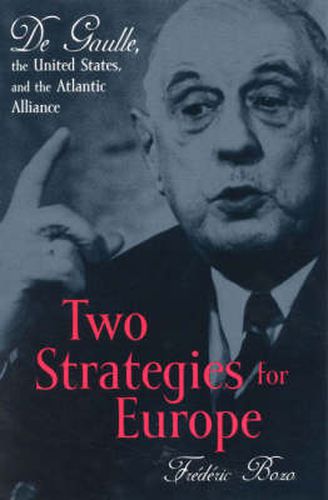Readings Newsletter
Become a Readings Member to make your shopping experience even easier.
Sign in or sign up for free!
You’re not far away from qualifying for FREE standard shipping within Australia
You’ve qualified for FREE standard shipping within Australia
The cart is loading…






This book explores the often stormy French-US relationship and the evolution of the Atlantic Alliance under the presidency of Charles de Gaulle (1958-1969). The first work on this subject to draw on previously inaccessible material from US and French archives, the study offers a comprehensive analysis of Gaullist policies toward NATO and the United States during the 1960s, a period that reached its apogee with de Gaulle’s dramatic decision in 1966 to withdraw from NATO’s integrated military arm. This launched the French policy of autonomy within NATO, which has since been adapted without having been abandoned. De Gaulle’s policy often has been caricatured by admirers and detractors alike as an expression of nationalism or anti-Americanism. Yet Bozo argues that although it did reflect the General’s quest for grandeur, it also, and perhaps more important, stemmed from a genuine strategy designed to build an independent Europe and to help overcome the system of blocs. Indeed, the author contends, de Gaulle’s actions forced NATO to adapt new strategic realities. Retracing the different phases of de Gaulle’s policies, Bozo provides valuable insight into current French approaches to foreign and security policy, including the recent attempt by President Chicar to redefine and normalize the France-NATO relationship. As the author shows, de Gaulle’s legacy remains vigorous as France grapples with European integration, a new role within a reformed NATO, and relations with the United States.
$9.00 standard shipping within Australia
FREE standard shipping within Australia for orders over $100.00
Express & International shipping calculated at checkout
This book explores the often stormy French-US relationship and the evolution of the Atlantic Alliance under the presidency of Charles de Gaulle (1958-1969). The first work on this subject to draw on previously inaccessible material from US and French archives, the study offers a comprehensive analysis of Gaullist policies toward NATO and the United States during the 1960s, a period that reached its apogee with de Gaulle’s dramatic decision in 1966 to withdraw from NATO’s integrated military arm. This launched the French policy of autonomy within NATO, which has since been adapted without having been abandoned. De Gaulle’s policy often has been caricatured by admirers and detractors alike as an expression of nationalism or anti-Americanism. Yet Bozo argues that although it did reflect the General’s quest for grandeur, it also, and perhaps more important, stemmed from a genuine strategy designed to build an independent Europe and to help overcome the system of blocs. Indeed, the author contends, de Gaulle’s actions forced NATO to adapt new strategic realities. Retracing the different phases of de Gaulle’s policies, Bozo provides valuable insight into current French approaches to foreign and security policy, including the recent attempt by President Chicar to redefine and normalize the France-NATO relationship. As the author shows, de Gaulle’s legacy remains vigorous as France grapples with European integration, a new role within a reformed NATO, and relations with the United States.